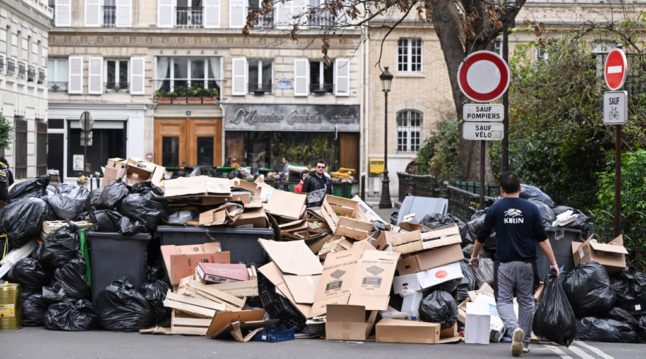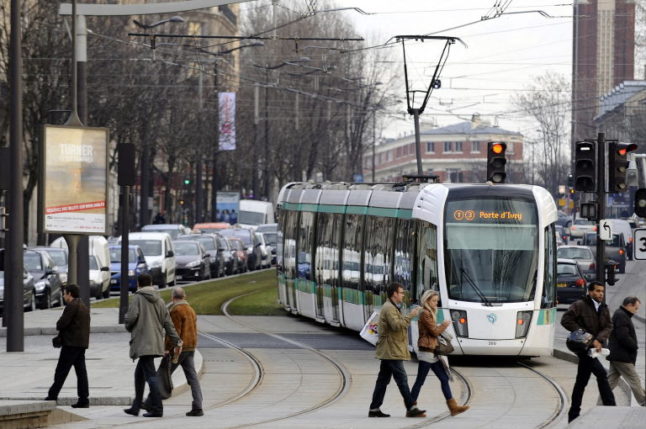Monday marked the eighth day of the garbage workers’ strike against the pension reform, as mounds of garbage remained scattered along sidewalks across Paris and some other parts of the country.
After just one week of the strike action, there were at least 5,400 tonnes of uncollected rubbish on the sidewalks of the capital, according to an assessment by the Paris City Hall on Sunday.
Strike action has mostly hit France’s capital, but garbage collectors in other parts of the country, such as Rennes, have also walked out.
“What will stop the strike is that Emmanuel Macron withdraws his reform. If this is the case, then Paris will become clean very quickly. We know how to do that”, Régis Vieceli, the head of the CGT branch representing garbage workers, told French daily Le Parisien.
Des #éboueurs toujours en #grève, 5.400 tonnes de déchets non ramassées à #Paris pic.twitter.com/52ixeva0h5
— Guillaume Asskari (@Gasskari) March 12, 2023
🇫🇷 🗑️ FLASH | La grève des #éboueurs va être reconduite jusqu’à mercredi à #Paris.
👉 Plus de 5400 tonnes de déchets se sont accumulés dans les rues de la capitale. pic.twitter.com/sOxcoO3pSD
— Cerfia (@CerfiaFR) March 13, 2023
On Monday, unions called for strike action to continue until at least Wednesday, March 15th, which is the same day that the country’s eight largest union federations have called for another day of mass strikes and demos.
Workers will then vote to decide whether to continue rolling strike action.
READ MORE: Calendar: The latest French pension strike dates to remember
As of Monday, the city’s main three incineration plants – located in Ivry-sur-Seine (shown in the image below), Issy-les-Moulineaux and Saint-Ouen – were still at a standstill.
En direct avec le secrétaire général CGT FTDNEEA de l’incinérateur de Ivry sur Seine #Bloquage jusqu’aux dents tenons pour un avenir saint
Petite précision, pas besoin d’être syndiqué pour soutenir le mouvement #paris #grève pic.twitter.com/l1ssVosOSY— Ludovic 🧹♻️ (@ludovicf_off) March 11, 2023
The capital’s household waste agency Syctom (Syndicat mixte central de traitement des ordures ménagères) told AFP that it has been re-routing dustbin lorries to other storage and treatment sites in the region and has yet to resort to calling in the police.
Strike action has hit about half of Paris’ districts, such as the 2nd, 5th, 6th, 8th, 9th, 12th, 14th, 16th, 17th and 20th arrondissements.
Paris garbage collectors on strike against pension reform. View outside my apartment building this morning & new note on the trash room door tonight. pic.twitter.com/UOa9eujEio
— Genevieve Mansfield (@gen_mansfield) March 8, 2023
Rue de la Jonquière, de Paris 17, envahie par les poubelles et les détritus.
Depuis Lundi, c'est comme ça.
Suite à la Grève des Retraites.#Déchets #Déchet #RuedelaJonquière #Paris17 #Poubelles #Éboueurs #GrèveDesRetraites #Détritus #Propreté #Poubelle #Nettoyage #Paris (#Photo) pic.twitter.com/xBeRO6zAo4— David CASTAGNET (@TeamCastagnet) March 10, 2023
It is publicly employed garbage workers (Ville de Paris in the map below) – responsible for waste collection across half of the city – who have walked out.
[LE SAVIEZ-VOUS] À Paris, la collecte des ordures est répartie entre public et privé.
👉🏻 À #Paris17, le ramassage des déchets est assuré par les services municipaux centraux @Paris #Propreté
Source : Le Parisien pic.twitter.com/end7G7Oe3I— Mairie du 17e (@Mairie17) March 13, 2023
The other half of the districts, including the 7th arrondisement as shown in the image below, are managed by private service providers.
Dans le VIIème, malgré la grève des éboueurs, je n’ai pas vu une seule poubelle qui traîne, tout l’arrondissement est nickel. Bravo @datirachida. Comme quoi quand on veut on peut. pic.twitter.com/ioPvRvbxvh
— Eric Klein (@EricKLein_) March 12, 2023
The CGT union representing garbage collectors and drivers told AFP that workers in this sector can currently retire from 57 years of age, but would face another two years of work under the reform plans which still grant early retirement for those who faced tough working conditions.
Life expectancy for the garbage workers is 12-17 years below the average for the country as a whole, the CGT told AFP.
READ MORE: What next for France’s controversial pension reform bill?
Reactions from politicians
Several left-wing politicians have taken to social media to support the garbage collectors’ strike, with some members of the France Unbowed party have mobilised to offer €20,000 in support for the employees’ strike fund.
Ce mouvement historique contre la #ReformeDesRetraites on le doit aux travailleuses et travailleurs.
Ce mouvement tiendra par la solidarité.
Ce matin en remettant 20 000€ aux éboueurs en grève.
Cette après midi à la manifestation.Le Gouvernement craque. Nous allons gagner.🔥 pic.twitter.com/aRo8YFoxXM
— Louis Boyard (@LouisBoyard) March 11, 2023
Meanwhile those on the opposite side of the political spectrum have begun calling on Paris’ mayor, Anne Hidalgo, to step in.
The mayor of Paris 17th arrondisement and member of the centre-right Les Republicains party, Geoffroy Boulard, wrote a letter to Hidalgo asking that the district be allowed to use a private garbage collection provider.
🔴 🚛 Au premier jour de la grève, j’ai proposé à la Maire de Paris de recourir à un prestataire privé mobilisable en 24h pour ramasser les ordures #Paris17
Toujours pas de réponse !
❌ Territorialisation = des mots, toujours pas d’action en matière de propreté #Quandonveutonpeut pic.twitter.com/Eeie3unfCW— Geoffroy Boulard (@geoffroyboulard) March 9, 2023
Others, like Rachida Dati, the mayor of Paris 7th district, have called on Hidalgo to allow for “an integration of private companies” to support and ensure minimum services during strikes.



 Please whitelist us to continue reading.
Please whitelist us to continue reading.
…..its unfortunate that these jesters want to hold the Olympic Games.